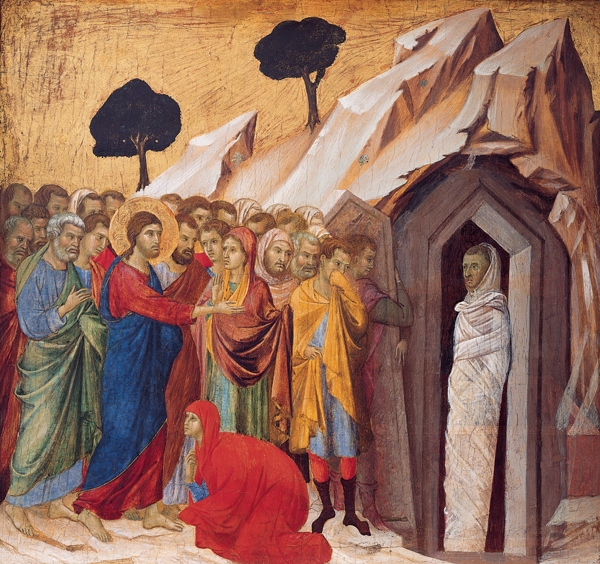- Feb 5, 2002
- 166,693
- 56,303
- Country
- United States
- Faith
- Catholic
- Marital Status
- Married
- Politics
- US-Others
In today’s Gospel, we hear the story of the raising of Lazarus from the dead. The story marks a significant turning point in the ministry of Jesus: it is because of this incident that the Temple leadership in Jerusalem resolves to have Jesus killed; a supreme irony to be sure.
As is proper with all the Gospel accounts, we must not see this as merely an historical happening of some two thousand years ago. Rather, we must recall that we are Lazarus; we are Martha and Mary. This is also the story of how Jesus is acting in our life.
Let’s look at this Gospel in six stages and learn how the Lord acts to save us and raise us to new life.
I. HE PERMITS. Sometimes there are trials in our life, by God’s mysterious design, to bring us to greater things. The Lord permits these trials and difficulties for various reasons. But, if we are faithful, every trial is ultimately for our glory and the glory of God.
Now a man was ill, Lazarus from Bethany, the village of Mary, and her sister Martha. Mary was the one who had anointed the Lord with perfumed oil and dried his feet with her hair; it was her brother Lazarus who was ill. So the sisters sent word to him saying, “Master, the one you love is ill.” When Jesus heard this he said, “This illness is not to end in death, but is for the glory of God, that the Son of God may be glorified through it.”
Notice that Jesus does not rush to prevent the illness of Lazarus. Rather, He permits it temporarily in order that something greater, God’s Glory in Jesus, be made manifest. In addition, it is for Lazarus’ own good and his share in God’s glory.
It is this way with us as well. We do not always understand what God is up to in our life. His ways are often mysterious, even troubling to us. But our faith teaches us that His mysterious permission of our difficulties is ultimately for our good and for our glory.
Continued below.

As is proper with all the Gospel accounts, we must not see this as merely an historical happening of some two thousand years ago. Rather, we must recall that we are Lazarus; we are Martha and Mary. This is also the story of how Jesus is acting in our life.
Let’s look at this Gospel in six stages and learn how the Lord acts to save us and raise us to new life.
I. HE PERMITS. Sometimes there are trials in our life, by God’s mysterious design, to bring us to greater things. The Lord permits these trials and difficulties for various reasons. But, if we are faithful, every trial is ultimately for our glory and the glory of God.
Now a man was ill, Lazarus from Bethany, the village of Mary, and her sister Martha. Mary was the one who had anointed the Lord with perfumed oil and dried his feet with her hair; it was her brother Lazarus who was ill. So the sisters sent word to him saying, “Master, the one you love is ill.” When Jesus heard this he said, “This illness is not to end in death, but is for the glory of God, that the Son of God may be glorified through it.”
Notice that Jesus does not rush to prevent the illness of Lazarus. Rather, He permits it temporarily in order that something greater, God’s Glory in Jesus, be made manifest. In addition, it is for Lazarus’ own good and his share in God’s glory.
It is this way with us as well. We do not always understand what God is up to in our life. His ways are often mysterious, even troubling to us. But our faith teaches us that His mysterious permission of our difficulties is ultimately for our good and for our glory.
Continued below.

That You May Believe - A Homily for the 5th Sunday of Lent - Community in Mission
In today’s Gospel, we hear the story of the raising of Lazarus from the dead. The story marks a significant turning point in the ministry of Jesus: it is because of this incident that the Temple leadership in Jerusalem resolves to have Jesus killed; a supreme irony to be sure. As is proper with...
blog.adw.org
